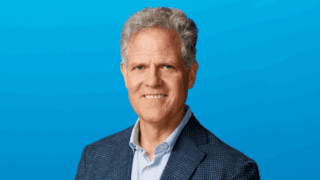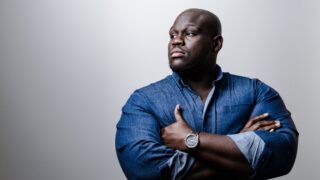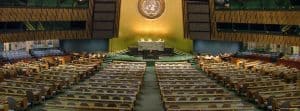The Lavin Agency Speakers Bureau
A speakers bureau that represents the best original thinkers,
writers, and doers for speaking engagements.
A speakers bureau that represents the best original thinkers,
writers, and doers for speaking engagements.
To save our democracy, we must invest in our cities, our people, and our institutions today.
Crises reveal the soul of our democracy—and they can show us how to move forward together, says award-winning sociologist Eric Klinenberg. The director of NYU’s Institute for Public Knowledge and author of Palaces for the People and 2020, Eric has spent his career exploring how people respond to crises like heat waves and pandemics. A thoughtful yet hilarious speaker, he reveals the leadership strategies that actually work in times of crisis, how libraries and other shared spaces can help save our democracy, how investing in our institutions can bring our polarized communities back together, and much more. In a time of deep division, Eric offers us a path forward towards mutual resilience and solidarity.
“Wow. A comprehensive, entertaining, and compelling argument for how rebuilding social infrastructure can help heal divisions in our society and move us forward.”—Jon Stewart, former host of The Daily Show
Eric Klinenberg is a bestselling author, renowned sociologist, and Helen Gould Shepard Professor of Social Science and Director of the Institute for Public Knowledge at New York University.
His latest book, 2020, is a “gripping, deeply moving account of a signal year in modern history” (Siddhartha Mukherjee, Pulitzer Prize-winning author of The Emperor of All Maladies). 2020 follows seven ordinary New Yorkers and their communities in a year marked by crisis, and is a vital addition to Eric’s work on democracy, solidarity, wellbeing, infrastructure, and more. MSNBC’s Chris Hayes calls it “a masterful piece of rigorous journalism, rigorous sociology, and incredible story-telling.” In a starred review, Booklist calls it simply “superb.”
In his previous book, Palaces for the People, Eric argues that social infrastructure, “the physical places and organizations that shape the way people interact,” is the surprisingly simple key to building a democracy that works for everyone. Our ability to live and work together depends on rebuilding our libraries, parks, churches and schools—all the places that strangers and familiars alike mingle and cross paths. Palaces for the People is “an engrossing, timely, hopeful read, nothing less than a new lens through which to view the world” (Booklist starred review). It was named one of NPR’s Best Books of the Year, as well as a New York Times Book Review Editors’ Choice.
An innovative and optimistic speaker, Eric sheds light on demographic, social, and environmental transformations. A professor of Sociology and Director of the Institute for Public Knowledge at New York University, his body of work includes Heat Wave, where he looked at the future of cities in the age of climate change, and Going Solo, where he charted the societal impact of people who live alone. All together, he offers audiences a spectrum of human life; how we live, and how we live together.
“[In Palaces for the People ], Klinenberg persuasively illustrates the vital role [space plays] in repairing civic life ‘in an era characterized by urgent social needs and gridlock stemming from political polarization.’”— Publisher’s Weekly
Eric is a lively presence on stage, with a knack for finding humor and spontaneous insight. He has appeared on TV programs and podcasts (like This American Life) and has written for The Guardian, Rolling Stone, The New York Times Magazine, and The Wall Street Journal, among others.

Author, Today Was Fun: A Book About Work (Seriously) Workplace Culture Expert Senior Advisor, SYPartners

Author, Lucky by Design Wharton Professor of Business Economics and Public Policy Forbes 30 Under 30 in Law and Policy

Harvard Business School Behavioral Science Professor "40 Under 40 MBA Professor" Author of TALK: The Science of Conversation and the Art of Being Ourselves

Author, Today Was Fun: A Book About Work (Seriously) Workplace Culture Expert Senior Advisor, SYPartners

Author, How to Make Your Brain Your Best Friend Neuroscientist with 2 Million Followers Across Social Media Platforms

Speaker on Stress and Leadership in the Workplace Columbia Business School Professor Host, TED Business Podcast Expert, Limitless with Chris Hemsworth

One of America's Foremost Experts on the Declaration of Independence Award-Winning Author, Disunion Among Ourselves

Author, We Refuse to Forget and BLACK MOSES Contributing Writer, The New York Times Magazine Associate Professor, Northeastern University
New Yorker Writer Author of Antisocial

#1 New York Times Bestselling Author of Grit and Situated | Pioneering Researcher on Grit, Perseverance, and the Science of Success

Nobel Prize Winner | 3rd Most Cited Economist in the World | Bestselling Co-Author of Why Nations Fail and Power and Progress

Harvard Business School Behavioral Science Professor | "40 Under 40 MBA Professor" | Author of TALK: The Science of Conversation and the Art of Being Ourselves

#1 New York Times Bestselling Co-Author of Abundance | Host of thePlain English Podcast | Founder of the Substack Derek Thompson

#1 New York Times Bestselling Author of How the Word Is Passed and Above Ground | The Atlantic Staff Writer

At the age of 250, the United States is anything but united. But as we look back on our country’s history and forward to the next 250 years, acclaimed NYU sociologist, bestselling author, and visionary place-maker Eric Klinenberg is proposing a radical way forward: Build a bridge.
Thousands of bridges, actually, in communities large and small. Bridges, in Eric’s view, come in all varieties. They are libraries, parks, and playgrounds. They are schools, soccer fields, swimming pools, and civic centers. They are vital social infrastructure: the physical places that allow or encourage us to engage each other across social and ideological lines, helping divided communities search for common purpose, shared ambitions, and linked fate.
We, the people, have grown atomized, polarized, unequal, and distrustful. Today, with our institutions in peril and our democracy in crisis, repairing the social fabric and revitalizing civil society are among our most urgent tasks. Drawing on decades of research and practice, Eric shows why bridges must be the foundation of any plan to keep American ideals alive for another 250 years.

Why look back at times of crisis? Because “crises allow us to see ourselves more clearly,” says sociologist and author Eric Klinenberg. Heat waves, pandemics, and other overlapping crises have shaped us in ways we don’t even fully recognize yet—and we need to grapple with our past in order to forge a better path forward.
In this hopeful, thought-provoking talk, Eric draws on his book 2020 to tell stories of ordinary people coming together in community, from an elementary school principal to a subway custodian. Through these stories, he encourages us to develop our own networks of solidarity, building stronger communities and a healthy democracy. He offers lessons on leadership: what do we do in a crisis, and how can we prepare for the next one? Ultimately, he shows us how we can use this insight to move forward together.

In this keynote based on Palaces for the People, Eric Klinenberg guides audiences through his deeply researched conception of social infrastructure, and how we can build it together. The future of democratic societies rests not simply on shared values but on shared spaces, he explains. Our libraries, childcare centers, bookstores, places of worship, and parks are where crucial, sometimes life-saving connections, are formed. These places where people gather and linger, making friends across group lines, strengthen the entire community. When strong, neighborhoods flourish; when neglected, as it has been in recent years, families and individuals must fend for themselves.
This talk offers a timely and empathetic blueprint for change, showing how how social infrastructure is helping us solve some of our most pressing challenges: isolation, crime, education, addiction, political polarization, and even climate change.

Culture eats strategy for breakfast. We’ve all heard that before. But where does a great culture start? It starts when your office feels like a community of friends. As office workers, we spend most of our waking hours in an environment that boasts as many computers as people—and yet we rarely think about how this affects our productivity, our happiness, or our ability to work together.
In this customized talk, sociologist Eric Klinenberg brings social infrastructure to a corporate scale, showing your audience the ways that physical space can be optimized to your needs. Creative workspace? Clear and open dialogue? What about a day care center? Eric will tell you about how Google built soccer fields, bike paths, and gardens around their headquarters—and while you may not be Google, there is something to be learned from any successful space. This talk will leave you with the knowledge and motivation to introduce connection-building changes to your workplace, no matter the size.